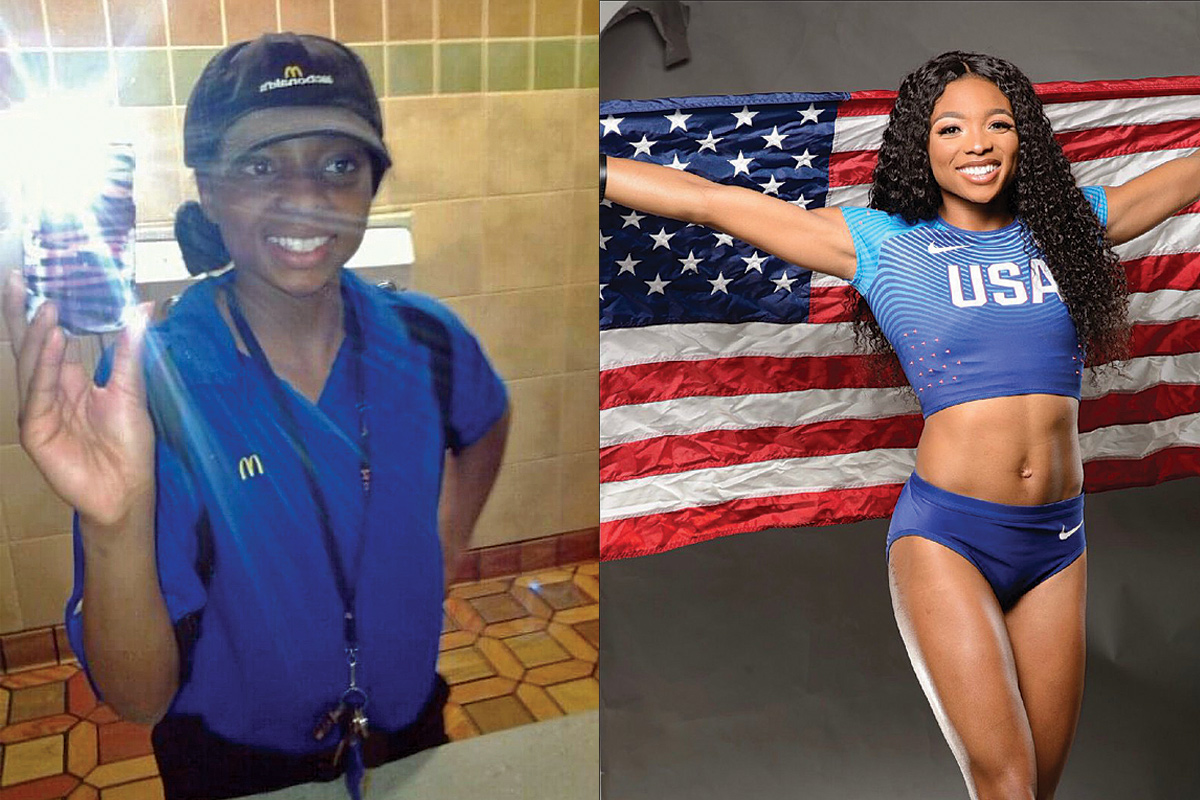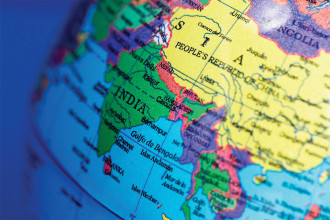
he minimum wage could have tripped Quanesha Burks up at the starting line of her career.
For Olympic jumper Quanesha Burks, the road to the Tokyo games started in a surprising place: a McDonald’s.
Raised by her grandparents in Hartselle, Alabama, she got her first job there at 17. Her days began at 4:30 am, driving her grandmother to work at a nursing home, then ferrying her four younger siblings off to school. After school and track practice, she’d head to McDonald’s and work until 10 pm, the latest legally allowed for high schoolers. All her earnings went toward paying her grandmother’s car insurance, but she dreamed of going to college.
To get there, she strove for scholarships. A friend bought her some proper cleats, and she began to train. The work paid off. Burks placed third in the triple jump at the 2012 Junior Olympics, then swept first place in 2013 state competitions for the 100 metre, long jump, and triple jump.
She was soon fielding calls from college recruiters between orders at the drive-thru.
Minimum wage laws violate the rights of both employers and would-be employees, mandating that they may not act on their own judgement when they deem arrangements for lower pay to be mutually beneficial. And as economists have long known, such laws have other big consequences.
Super-Sized Careers from Small Beginnings
Burks is not the first high achiever whose early years included a stint under the golden arches. Jay Leno, Rachel McAdams, Shania Twain, and Jeff Bezos all worked there, too, as did Olympians Amy Van Dyken and Carl Lewis. Many attribute their later success to the work ethic they learned there, including former House Speaker Paul Ryan.Burks offers similar praise.
“When I worked at McDonald’s, I thought it was the best job ever,” she recently told Sports Illustrated. “I was making $100 every two weeks. It’s terrible, but I came to work every day happy and I knew it was all part of my goal to go to college.” Burks’s sentiment is refreshing. Many denounce entry-level jobs and the companies who provide them for not paying a ‘living wage’, and many politicians now seek to increase the federal minimum wage to $15 per hour. Of course, such jobs pay relatively little and are not suitable for household ‘breadwinners’ over the long term. But, for most who work them, they serve as an important stepping stone. My first job, bagging groceries and collecting carts at a grocery store, taught me to show up on time and be helpful to customers. Factoring in the number of eggs I broke and loaves of bread I squashed, my early efforts may not have repaid the store the $7.50 per hour I was making. But, in time, I leveled up, foreseeing needs and solving problems before they arose. Without these skills, it’s doubtful I could later have landed a fry-cook job at my university’s cafeteria, and the things I learned there prepared me for later jobs at an Apple store, a Nashville recording studio, and so forth. The soft skills that entry-level jobs teach — responsibility, teamwork, diligence, etc — are universally marketable and transferable to all varieties of endeavours. Likewise, Burks’s path toward gold medals can be traced back to the golden arches. “Working in a fast food chain helped me become the person I am,” she told ESPN. How to handle things under pressure. During rush hour you have to flip burgers, take orders and be professional at the same time. In track and field, you’re at the Olympic trials, every jump counts. You’re trying to make a team, so everything I learned from a young age has equipped me to be where I am.Minimum wages effectively ban from the job market all who do not yet have the skills to produce value higher than the cost that the minimum wage mandates. This means unemployment, especially for the young and inexperienced.Had the grocery store been forced to pay me $15 per hour straight away when I was not worth that to them and had not yet proven that I could act like a responsible adult, I doubt I’d have gotten the job at all. It would have been a losing proposition for the store. The same could probably be said for Burks’s first job. Both of our careers would have been tripped up at the starting line by a $15 per hour minimum wage.
Minimum Wage Laws Come with a Side of Unemployment
Minimum wage laws violate the rights of both employers and would-be employees, mandating that they may not act on their own judgement when they deem arrangements for lower pay to be mutually beneficial. And as economists have long known, such laws have other big consequences. They come with a side of unemployment, and however much politicians might like to have their burger and eat it too, this is an instance where they must be told, ‘you can’t have it your way’. Minimum wages effectively ban from the job market all who do not yet have the skills to produce value higher than the cost that the minimum wage mandates. This means unemployment, especially for the young and inexperienced. Dirty Jobs star Mike Rowe likens this to cutting the bottom rung off the career ladder. That’s just what a McJob is — an entry-level opportunity. McDonald’s aims to provide ‘the best first job’, realising that most employees will use it as a stepping stone, even encouraging them to do so. Burks is yet another example of how one can jump from the golden arches to great heights. On July 31, she made a solid debut on the world stage, missing the mark to qualify by only about four centimetres (only the top 12 qualify for the medal event, and she came in 13th). The opportunity would never have come about without the long evenings working the drive-thru. “It’s been a journey,” she says, “and it all started with a little girl working at McDonald’s.” Source: fee.org
Published Date: August 31, 2021, 12:00 am
Post Comment
E-Magazine
RELATED Economics





-1758107444.jpg)